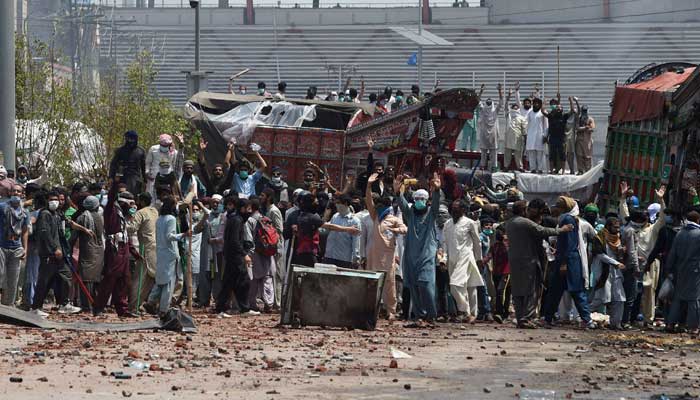Saad Rizvi asks workers to end Lahore sit-in, shura members to surrender to the law
Chief of the banned TLP party says that the call for a protest on April 20 must be taken back
The chief of the banned Tehreek-e-Labbaik Pakistan (TLP), Saad Rizvi, has purportedly called for an end to the ongoing protest outside the outfit's Masjid Rehmatulil Alameen headquarters, a newly surfaced letter shows.
"The sit-in outside Masjid Rehmatulil Alameen must immediately come to an end," Rizvi wrote, in a note addressed to the shura arkaan (council members), dated April 17, a copy of which is available with Geo News.
"The workers must return peacefully to their homes," Rizvi said.
He added that the council members must surrender themselves to the law as "owing to their stubbornness, hundreds of workers, as well as the general public, have been suffering".
The TLP chief said that the call for a protest on April 20 must be taken back.
TLP naib emir Syed Zaheerul Hassan Shah was tasked by Rizvi to expedite the implementation of his directives.
Rizvi's earlier letter
The April 17 letter follows one purportedly written by Rizvi on April 15, which was shared by Special Assistant to Prime Minister Imran Khan on Political Communication Shahbaz Gill on Twitter.
Rizvi had also then asked his followers to "immediately end all protests and road blockages".
"I, Hafiz Saad Rizvi, son of (late) Khadim Hussain Rizvi, with complete clarity of mind, and without any force, appeal to all the central leadership and workers of the Tehreek-e-Labbaik that in the interest of the nation and the public good, please do not take any illegal steps.
"All protest rallies and road blockages must immediately be brought to an end. All workers must disperse peacefully and head on to their respective homes and fully cooperate with law enforcement agencies," read Rizvi's letter.
He had also specifically called upon the protesters to end the protest outside the Masjid Rehmatul Lil Alameen.
Rizvi's arrest and TLP's blacklisting
Saad Rizvi was taken into police custody on April 12 as a pre-emptive measure ahead of TLP's protest intended for April 20.
On April 15, after a three-day long nationwide protest by TLP, which left at least six dead and hundreds injured, it was declared a proscribed organisation.
According to the notification by the Ministry of Interior: "The federal government has reasonable grounds to believe that Tehreek Labbaik Pakistan is engaged in terrorism, acted in a manner prejudicial to the peace and security of the country, involved in creating anarchy in the country by intimidating the public, caused grievous bodily harm, hurt and death to the personnel of Law Enforcement Agencies and innocent by-standers, attacked civilians and officials, created wide-scale hurdles, threatened, abused and promoted hatred, vandalised and ransacked public and government properties including vehicles and caused arson, blocked essential health supplies to hospitals, and has used, threatened, coerced, intimidated, and overawed the government [and] the public and created sense of fear and insecurity in the society and the public at large."
"Now, therefore, in exercise of the powers conferred by Section 11B(1) of the Anti-Terrorism Act, 1997, the Federal Government is pleased to list Tehreek Labbaik Pakistan in the First Schedule to the said Act as a proscribed organisation for the purposes of the said Act," the notification added.
Rizvi placed on Fourth Schedule
On Saturday, the Punjab government placed Rizvi on the Fourth Schedule of the Anti-Terrorism Act (ATA).
In a notification, Punjab's home department said his assets have been frozen, and his national identity card has been blocked — which means he cannot conduct transactions via banks, nor can he sell or purchase any property.
Rizvi was also asked to submit his original passport to the in-charge of the police station tasked with the care of the jurisdiction where his residence falls.
The names of all Fourth Schedulers are referred to the local police and law-enforcement agencies for effective monitoring. If a Fourth Scheduler wants to move somewhere, he has to inform the nearby police station.
-
Security forces gun down 30 terrorists in multiple IBOs in KP: ISPR
-
MQM-P calls for new province in Sindh
-
US report validates Pakistan military edge over India: PM
-
Banned TTP poses serious threat to Pakistan security: UNSC panel
-
CM Afridi clarifies remarks on by-poll after ECP requests army deployment
-
Dubai sees 3.2m Pakistani passengers in 2025 as airport sets new milestone
-
Security forces kill 23 Indian proxy terrorists in KP's Kurram
-
Pakistan to construct island to boost oil exploration: report












